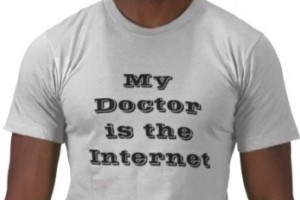 In this article (click here to read it online or here to download a PDF version) many leading doctors complain that by resorting to Google for diagnosing themselves, patients are eroding the traditional doctor-patient trust.
In this article (click here to read it online or here to download a PDF version) many leading doctors complain that by resorting to Google for diagnosing themselves, patients are eroding the traditional doctor-patient trust.
IMO, they have themselves to blame.
It’s only a matter of time before the Internet alters the medical profession, just as it has upended many other knowledge industries. However, knowingly or unknowingly, doctors are hastening the potential disruption with their own unsophisticated actions. Here are two personal examples:
- I recently had a neckache and went to a GP. He pulled up Google search results on his PC. Beckoning me over to his side of the table, he asked me to take a look at a few pictures and videos that explained the root cause.
- A specialist fired up an Android app and agreed with my suspicion that drowsiness could be the unintended side effect of a newly prescribed capsule.
By accessing the Internet in front of me, I momentarily felt that both doctors were elevating the stature of freely available information to their own level.
This feeling didn’t last long for several reasons:
- After using the Internet for over 15 years, I’ve realized that the old saying “don’t believe everything you read in the newspapers” applies equally well to the web.
- On more than one occasion, I’ve received diametrically opposite diagnoses from two websites for the same symptom
- From my last few years in digital marketing, I know that search engines do not vet the content of the websites they display on their results and have exposed me to the vagaries and vicissitudes of search engine rankings. By now, I’m convinced that just because a website ranks high on Google SERP does not mean it’s guaranteed to be authentic or accurate. More at Google Search – Upheaval Does Not Equal Abuse.
Therefore, I believe that machines can’t substitute doctors backed by several decades of training and practice. Personally, I’d rather take the advice of my doctors than indulge in too much self-diagnosis.
 However, that’s only me. The typical patient might be like the one wearing this t-shirt.
However, that’s only me. The typical patient might be like the one wearing this t-shirt.
While talking to this patient, doctors might use technology merely as a prop to communicate clearly. However, the patient could misunderstand this and this gesture ends up having the unintended consequence whereby s/he treats Google on par with the doctor. Before adequate trust is established between the two parties, what’s to stop such a patient from heading directly to the Internet for a diagnosis the next time? Which is exactly the behavior that doctors mentioned in the beginning of this post are complaining about.
Even if they eventually visit a doctor for treatment – computers can’t cure ailments for now! – there’s a potential loss of trust that could hinder their future relationship.
Am I advocating that doctors should turn Luddites? Not at all.
I’m suggesting that doctors can draw inspiration from professionals in other knowledge-intensive industries who make heavy use of the Internet, yet preserve their stature in front of their customers.
Bankers use Bloomberg or Reuters terminals to trade securities.
Lawyers use Lexis-Nexis or Trial Smith to research case law.
These online resources contain authentic information and professionally curated articles. Some of them even warrant the accuracy of their data.
Doctors should use similar proprietary tools. No doubt they will cost a bomb. While that conveniently puts them out of reach of patients, it’s a small price for healthcare providers to pay for preserving the doctor-patient trust and still be tech savvy enough in today’s digital world.

